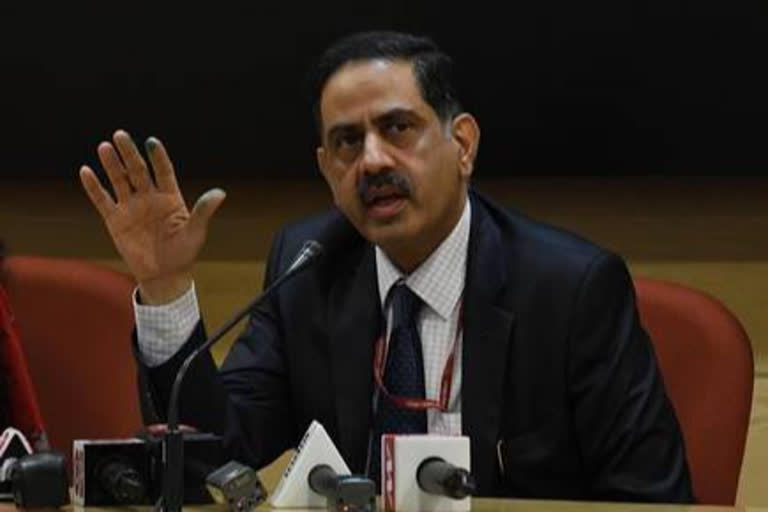New Delhi: India is likely to exclude convalescent plasma therapy from its national health clinical protocol after the therapy was found less effective in mitigating mortality of COVID-19 patients.
"Many studies have concluded that plasma therapy has not been very effective when it comes to reducing mortality due to COVID-19. We have discussed the issue in the national joint monitoring group meeting. We may exclude the Plasma therapy from the national health clinical protocol for COVID-19," said Dr Balram Bhargava, director-general of Indian Council of Medical Research (ICMR) On Tuesday.
Dr Bharaga was talking to the reporters on India's COVID management and current status along with other senior officials from the health ministry.
He said that Remdesivir and Hydroxy-chloroquine (HCQ) are also not performing as per expectations.
"As per interim results of WHO's solidarity trial, we have found that these medicines are not performing as per expectations. However, interim results have been put on the website but has not been peer-reviewed," said Dr Bhargava.
Dr Bhargava also said that there is data or evidence to ascertain that influenza vaccines will work on COVID-19.
Referring to the reinfection of COVID patients, Dr Bhargava said that if antibodies become weaker in five months, a COVID cured person may be infected again.
The ICMR DG said that scientists are monitoring the changing behaviour of the virus.
"The major symptoms of the virus are fever, cough and breathlessness. But, symptoms like diarrhoea, lost of a test and smell are also there," said Bhargava.
Union Health Secretary Rajesh Bhusan said that India has registered highest COVID-19 related recoveries in the world.
"We are in the second position as in terms of the number of coronavirus tests being conducted by any country," said Bhushan.
With the continuous recovery of COVID-19 patients, India's recovery rate stands at 88.63 per cent.
Bhushan said that India has recorded 310 cases per million in the last seven days, which is amongst the lowest globally.
The health secretary, however, said that Maharastra, Karnataka, Kerala, Tamil Nadu, Andhra Pradesh and West Bengal account for 64 per cent of India's total active cases.
Referring to the forthcoming festivities, Bhushan said that strict health protocol needs to be followed during festivities.
There is no scope for letting down our guard against COVID-19, he said. "Health protocol needs to be followed by all. However, if we don't follow protocol the cases may further increase," said Bhushan while referring to the funds of a Government panel that COVID cases will fall down by February.
He informed that a multidisciplinary central team will leave for Bihar tomorrow to monitor the health protocol in view of forthcoming state elections.
Talking on the COVID-19 vaccine procurement and distribution, Bhushan said that the National Advisory Committee on Immunisation has come up with a draft prioritisation plan for vaccine immunisation.
"If the vaccine trial becomes successful, we will be able to immune a considerable number of people between January to July. We are also in talks with the private organisations for vaccine immunisation process," said Bhushan.
He informed that India has 28,000 cold storage across the country to store vaccines.
Referring to the national digital health mission, Bhushan said that it's not mandatory to have a digital health ID to get the COVID-19 vaccine. Meanwhile, anticipating a surge of COVID-19 cases during forthcoming festivals, Bhushan said that government has initiated the process to import about 1,00,000 metric tons of liquid medical oxygen as a precautionary measure.
The health secretary, however, said that there was no scarcity of oxygen availability in the country in last 10 months with the daily production capacity enhanced to 6,862 metric tonnes by September and projected to further increase to 7,191 metric tonnes by the end of October.
"We have initiated the process of installing 246 oxygen generations plants in 18 states and union territories in the first phase, out of which 67 are at various stages of completion," said Bhushan.
He said that the average consumption of oxygen has increased to 2,791 metric tonnes per day from September 9 to September 15, which was the peak period for consumption.
"In spite of that, 14,932 oxygen was left in stock at the end of the week," Bhushan said.
He said that the health ministry has recently sent an SOP to states for rational use of oxygen.
As per the SOP, an oxygen monitoring committee is to be formed in every hospital to supervise inventory planning, oxygen consumption, regular repair and maintenance of the gas pipeline, gas plant and wall mounted gas outlets etc.
"District Magistrate (DM) assisted by Chief Medical Officer (CMO) will monitor the oxygen consumption in all facilities of the district on a weekly basis," added Bhushan.
Also Read: Joint research led by ICMR, WHO finds Remdesvir, Lopinavir, HCQ ineffective



